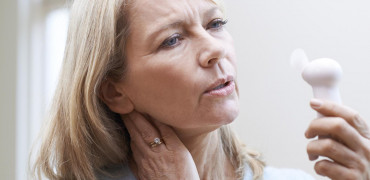This article is aimed at all the men and young females out there who think the menopause has nothing to do with them.
This coming Wednesday 18th October is World Menopause Day 2023, when we are asked to pause and think about the effect this hidden condition has on millions of women, each day.
And if you think this doesn’t affect you personally, you'll find that you definitely know someone that has been affected (whether you have realised it or not!).
It could be a colleague, an aunt, a mother, sister, gran or even a neighbour, but I promise you, you will know someone who is or has been affected.
For many of these women, the condition can be an isolating experience and the majority report that it also had a negative impact on their careers.
Managers wanting to help menopausal women can visit the Talking Menopause website.
Lack of knowledge is no excuse
The effects of the menopause can be made worse for many women because they lack support either at home or at work, and this often stems from lack of awareness, which is why the annual event seeks to focus attention on the menopause.
It’s organised by the International Menopause Society (IMS), which looks to raise awareness of the menopause and the support options available for improving health and wellbeing.
Hot flashes and sweats are the most common symptoms of the menopause and affect three out of four menopausal women.
They’re often characterised by a sudden feeling of heat that spreads throughout the body. In some cases, women have reported experiencing hot flashes every ten minutes throughout the day.
The menopause is different for every woman, but it’s not uncommon for symptoms including hot flashes to continue for many years.
However, demographically menopausal women are the fastest-growing group of workers in the UK, and in a survey by the British Menopause Society, 45% of women feel their symptoms have a negative impact on their work.
Businesses and managers that want to learn more about helping menopausal women could benefit from a quick visit to the Talking Menopause website.
No. 1 cause of death
This year’s theme for World Menopause Day is cardiovascular disease and the reason for this is that despite most people believing that breast cancer is the biggest cause of death in women, it is actually cardiovascular disease.
Researchers have recently discovered that a woman’s reproductive experiences throughout her life (including menstruation, pregnancy, any breast cancer treatments and menopause) can affect her chances of developing cardiovascular disease later in life.
Awareness of this can help to determine a women’s individual risk.
Reducing the risk
There are positive steps that women can take to prevent most cardiovascular events—heart attacks, heart failure, and stroke.
And, while it’s true that there a few exceptions, in most cases if you can identify the risk factors early on and take proactive steps, you can avoid developing cardiovascular disease.
It’s about making positive lifestyle choices to maintain good cardiovascular health. The top five most important lifestyle factors are:
- Not smoking
- Doing regular physical activity
- Healthy eating
- Maintaining a healthy weight
- Getting enough sleep.
If you incorporate these into your day-to-day life, the potential benefits are enormous.
One research study demonstrated that women could increase their life expectancy by as much as 14 years. Adopting these 5 lifestyle changes can also help improve blood pressure, blood sugar levels, and blood cholesterol.
Each of these factors is also associated with a greater chance of developing cardiovascular problems in the future.
The most important first step though is recognising you may have an issue and then talking to your doctor.
Awareness is key, so we could all benefit from a visit to the IM Society website and the useful information they hold there, including a white paper and a downloadable leaflet on cardiovascular disease, along with engagement tools, reports from around the world, and expert interviews.
Katie Mathers, Marketing Executive


